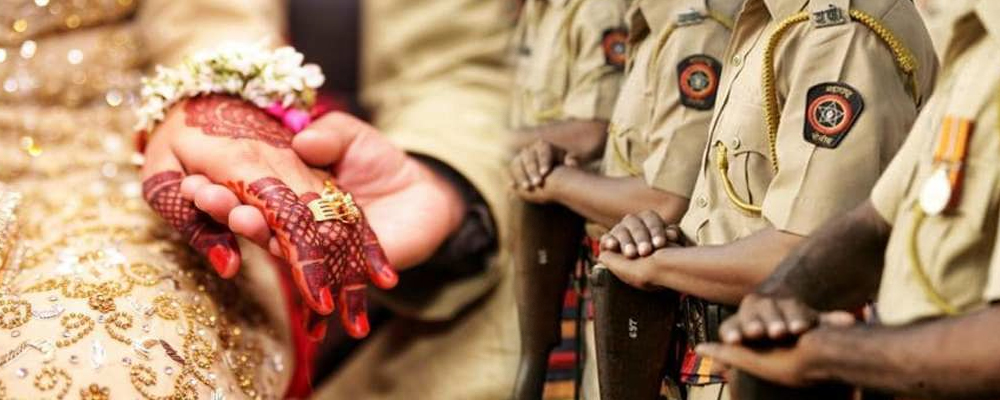Every Indian citizen has a guaranteed right to life and personal freedom under Article 21 of the Indian Constitution. Additionally, the Supreme Court and the High Court have ruled and expressed their opinions in favor of giving protection to couples who have wed outside of the norm, such as through a court ceremony. This article clarifies the need for couple protection by describing the difficulties a married couple encounters. False accusations of rape and kidnapping are levelled against the couple’s partners. The essay also discusses how to obtain security from the police, a legitimate authority. A couple can always go to the police station and report the harassment there first.
The court’s rulings aid in the development of the law’s protection of these couples’ rights to life and liberty. Many couples are compelled to be married in a non-traditional manner due to disagreement or rejection from their parents, society, caste, or religion. However, their parents, close relatives, or even society regularly torment them with unfounded accusations.
The High Court has begun to recognise and accommodate couples who are not married but are cohabitating or prepared to do so. With its action, the Court is demonstrating how hard it is working to adapt to how society has changed and how much more broadly Article 21 is being used in all walks of life. This resulted in the Supreme Court and the High Court extending protection to the spouses and further establishing rules pertaining to their life and liberty.
The Registrar of Weddings conducts the court marriage registration procedure; hence, unless one or both partners oppose the marriage, the High Court has no role in approving the legitimacy of court marriages. By giving the couple protection, the High Court does uphold each person’s constitutional rights.
Intimation Letter:
Typically, couples who enter into a court-married love union do not tell their loved ones or the police. This gesture was made because of parental or other related opposition to the marriage. A couple’s marriage may be opposed for a number of reasons, including rivalries based on caste, religion, or socioeconomic standing.
As a result, the spouses are the targets of false accusations. On the basis of such an allegation, the policeman may also intervene and harass the couple. There are two approaches to avoiding such challenges. First, a notice that acts as an intimation letter can be sent. The letter is written and submitted to the police station, the Superintendent’s residence or office, any female officers, even the Chief Minister, and other administrative authorities once the marriage has been registered. The marriage certificate is enclosed with the intimation letter and sent via registered mail. By delivering this letter of notification, the couple has prevented anyone from making false accusations against them, such as rape or kidnapping.
Need A Legal Advice
The internet is not a lawyer and neither are you. Talk to a real lawyer about your legal issue

Each couple or partner is entitled to legal representation if they are the subject of any claims of wrongdoing. When a person or organization is harassing a couple or one of the partners in a couple, one can go to the nearest police station and ask for the police’s protection.
They can also address their concern and ask for protection by going to the Senior Superintendent or the Commissioner of Police. In addition to these options, the couple may directly file a petition with the jurisdiction’s High Court to request protection from any third party. The police officer in the area where the couple is staying is given a directive by the High Court to protect the couple. To request protection from the Court, the marriage must be valid. The last resort should be to petition the High Court for protection.
Case Laws:
- In Shashi v. PIO, Sub Divisional Magistrate (Civil Lines), 2016 SCC OnLine CIC 10959, The CIC advised the Union and State Governments to consider including a column or leaving enough room on the registration application for declarations about reasonably anticipated threats to applicants’ lives or liberties that would prevent them from exercising their right to protection, and to instruct marriage officers to obtain a report from the concerned station housing officer following a thorough investigation of the allegations of threats and secure applicants’ lives if the SHO determines that a threat exists.
- A Supreme Court further stated that for parents to shun their offspring simply because they chose to marry outside of their caste or tribe would “hardly be a desirable social activity.” The Supreme Court emphasized that people have the freedom to select their life partner and said that society needs to start accepting inter-caste and inter-religious weddings without harassing the couples.
For protection, couples should consult a lawyer. If the couple are living In Delhi then they can consult a family lawyer in Delhi. Court Marriage lawyers in Delhi can also be consulted. Advice can be sought from top lawyers in Delhi.





 Talk to a Lawyer
Talk to a Lawyer